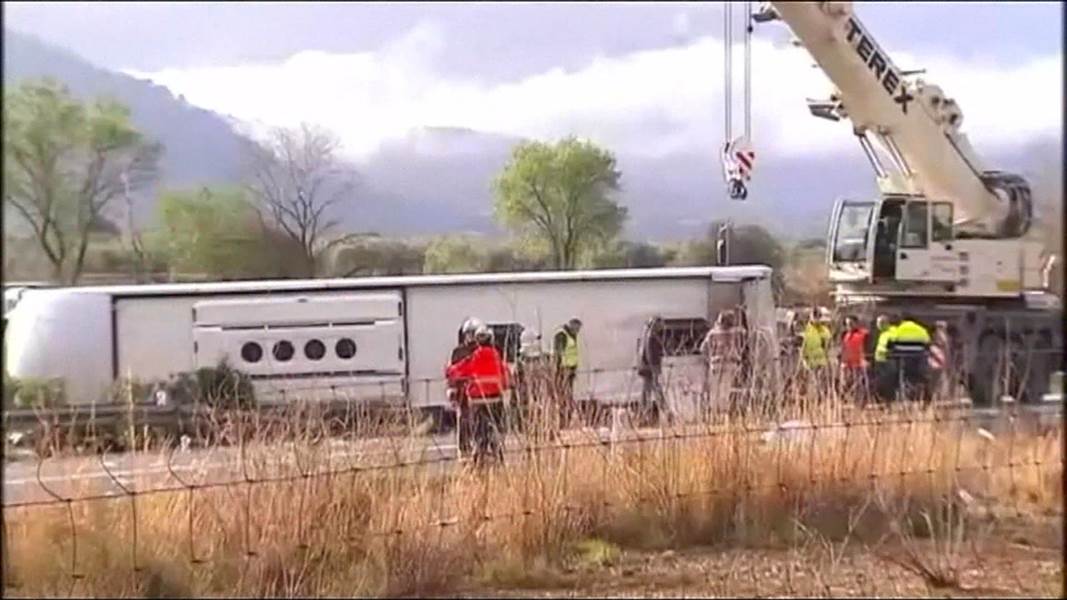
Thirteen women have been killed in a coach crash in Spain that was carrying British students, with more than 40 people injured.
Authorities said the vehicle hit a railing and then swerved on to the other side of the road on the AP97 highway near the small town of Freginals, about 95 miles south of Barcelona, Catalonia, Spain, colliding with a vehicle coming from the opposite direction.
Investigators are reportedly focusing on the theory that the coach driver crashed after falling asleep at the wheel.
It is not known how many of the students came from the UK, but a spokesman for Emergencies Catalunya said the injured, mostly aged between 22 and 29, were from 19 different countries, including Britain, Ireland, Peru, Bulgaria, Poland, Palestine, Japan, Ukraine, the Czech Republic, New Zealand, Italy, Hungary, Germany, Sweden, Norway and Switzerland.
The students were enrolled at the University of Barcelona as part of the European Erasmus exchange programme and had travelled to Valencia to take part in the renowned 'Fallas' fireworks festival and were returning in the early hours when the bus crashed.
Around 20 fire crews and seven ambulances were said to have been sent to the seen to help free people trapped inside.
The driver had 'hit the railing on the right and swerved to the left so violently that the bus veered onto the other side of the highway,' Mr Jordi Jane, Catalan Home Affairs Minister, said. 'The bus then hit a vehicle coming in the opposite direction, injuring two people inside,' he added. 'I hope and prey the final death toll stays at this dramatic figure.'
Mr Jane also said the coach driver was at a police station in Tortosa and confirmed 57 people had been aboard the vehicle. Thirty of the injured were being treated in hospital and most of the injuries are described as 'non life-threatening.'
One of the nine people seriously hurt was said to be fighting for life in hospital as 17 forensic experts worked on confirming the identities of the fatalities - said to be foreign and 'all women' by leading politicians - and organising the repatriation of their bodies.
The UK Foreign Office has confirmed it is working with Spanish authorities over the incident, but has been unable as yet to confirm how many British people were involved in the crash or whether any were killed, but it is understood there are no Britons among the dead.
The coach that crashed, a three-year-old vehicle which had passed all its MOTs was one of five belonging to the same firm that were returning together from Valencia but had become separated from the convoy. Spain's Interior Minister Jorge Fernandez Diaz said the crash appeared to be down to an 'undetermined human error' and revealed the coach driver was a veteran with 17 years experience who had never been involved in an accident and had tested negative for drugs and alcohol.
Catalan president Carles Puigdemont has confirmed all those who died are women before announcing two days of mourning, while La Liga football matches all held one minute's silence for the vicitim's before Sunday's games and a beach volleyball event the association had organised in Barcelona was cancelled following the crash.
The tragedy is one of the worst involving a coach in recent years in Spain. Twenty-eight people, mostly teenagers, died in July 2000 when a coach and a lorry collided with each other near the northern city of Soria.
Considerations
Scheduling travel overnight is convenient and a oft-used option for school trips, however the obvious hazards of driver tiredness need to be considered. Ensure your driver has plenty of rest and fluids and that they schedule regular stops in. It is also well worth nominating members of staff to sit up front with the driver to talk to them wherever possible to both keep them alert and spot any signs of tiredness and ask for a rest break.
What is the Fallas?
The Fallas, an annual festival held in Valencia commemorating St Joseph, which the students were returning from, takes place every March and attracts many foreign visitors as well as Spanish tourists due to its burning of effigies signifying rebirth from the ashes. The city of just over one million inhabitants swells as around two million revellers descend and huge cardboard, wood, papier-mache and plaster statues are set alight. Many poke fun at corrupt politicians and Spanish celebrities.
What is the Erasmus Scheme?
- Erasmus stands for European Region Action Scheme for the Mobility of University Students and was founded in 1987.
- It is a European Union exchange student programme with more than 4,000 universities participating across 33 countries.
- It is thought around 3 million students have taken part in the study abroad scheme since its inception, with Spain, Germany and France among the most popular destinations.
- Students who join the Erasmus Programme study between three months and a full academic year in another European country. Qualifications gained on the scheme are recognised by a student's 'parent university' when they return.
- Students do not pay extra fees for their time abroad and can apply for grants to cover living costs.



